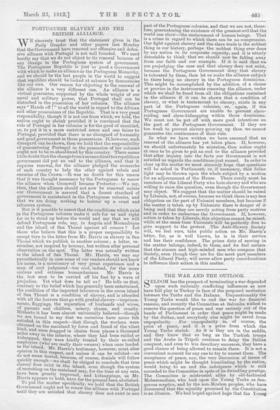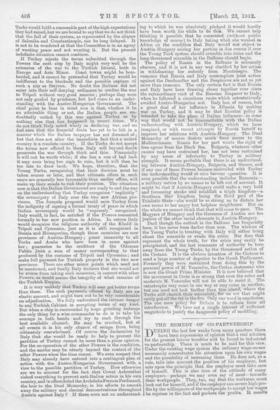THE WAR AND THE OUTLOOK.
SELDOM has the prospect of terminating a war depended upon such curiously conflicting influences as now have full play in Turkey in face of the proposed mediation between the Turks and the Italians. Unquestionably the Young Turks would like to end the war for financial reasons, and recently the Committee at Salonika wished to remove the question of peace and war entirely out of the hands of Parliament in order that peace might be made by the Sultan, and everybody else might be saved from unpopularity. For unpopularity is, of course, the price of peace, and it is a price from which the Young Turks shrink. As it is they are in the saddle, and they know that so long as the Turkish troops and the Arabs in Tripoli continue to delay the Italian conquest, and even to win desultory successes, they have a good chance of being allowed to remain there. It is not a convenient moment for any one to try to unseat them. The acceptance of peace, nay, the very discussion of terms of peace which might be thought humiliating by the nation, would bring to an end the indulgence which is still accorded to the Committee in spite of its dwindling prestige. The Committee is mistrusted alike by old-fashioned Mohammedans, who look upon the Young Turks as dan- gerous sceptics, and by the non-Moslem peoples, who have discovered that the equality promised by the Constitution is an illusion. We had hoped against hope that the Young Turks would fulfil a reasonable part of the high expectations they had raised, but we are bound to say that we do not think that the fall of their system, as represented by the cliques of Salonika and Constantinople, can be long delayed. It is not to be wondered at that the Committee is in an agony of wanting peace and not wanting it. But the present indefinite situation cannot continue.
If Turkey rejects the terms submitted through the Powers the next step by Italy might very well be the extension of the war to the Turkish littoral, both in Europe and Asia Minor. Coast towns might be bom- barded, and it cannot be pretended that Turkey would be indifferent to the blockade and the possible capture of such a city as Smyrna. No doubt the Italians did not enter into their self-denying ordinance to confine the war to Tripoli without very good reasons ; perhaps they were not only guided by prudence, but had come to an under- standing with the Austro-Hungarian Government. The chief point to bear in mind now is that, whether it be an admirable thing or not, the Italian people are un- doubtedly united by this war against Turkey as by nothing else that has happened in recent times. We do not think Italy acted wisely in declaring war, and we feel sure that the financial drain has yet to be felt in a manner which the Italian taxpayer has not dreamed of ; but that does not alter the immediate fact that a united country is a resolute country. If the Turks do not accept the terms now offered to them Italy will beyond doubt prosecute the war through thick and thin. Financially it will not be worth while ; if she has a run of bad luck it may even bring her nigh to ruin, but it will then be too late to draw back. We hope, therefore, that the Young Turks, recognizing that their decision must be taken sooner or later, and that ultimate offers in such cases are generally less favourable than earlier offers, will make up their minds to risk their position. The situation now is that the Italian Government are ready to end the war on the understanding that Turkey recognizes " implicitly " the sovereignty of Italy over the two new African pro- vinces. The formula proposed would save Turkey from the indignity of signing a formal treaty of peace in which Italian sovereignty would be "expressly " recognized. Italy would, in fact, be satisfied if the Powers consented formally to her new position in Africa. In return Italy would recognize the religious authority of the Khalif in Tripoli and Cyrenaica, just as it is still recognized in Bosnia and Herzegovina, though those countries are now provinces of Austria-Hungary ; grant immunity to all Turks and Arabs who have been in arms against her ; guarantee to the creditors of the Ottoman Public Debt a sum of money corresponding to that produced by the customs of Tripoli and Cyrenaica, ; and make full payment for Turkish property in the two new provinces. There are other minor points which need not be mentioned, and finally Italy declares that she would not be averse from taking such measures, in concert with other Powers, as would assure the integrity of what remains of the Turkish Empire.
It is very unlikely that Turkey will ever get better terms than these. The cash payments offered by Italy are an elastic amount, and might turn out to be very considerable on adjudication. We fully understand the intense danger to any Turkish Cabinet in accepting terms of any kind. But when a ship is surrounded by huge grinding icebergs the only thing for a wise commander to do is to take his courage in both hands and try to rush through the best available channel. He may be crushed, but at all events it is his only chance of escape from being ultimately overwhelmed. Of course the declaration by Italy that she would be ready to help to prevent the partition of Turkey cannot be more than a pious opinion. For the co-operation of the other Powers is the condition, and the matter may be utterly beyond the control of the other Powers when the time comes. We even suspect that Italy may already have entered into a contingent plan of action with the Austro-Hungarian Government with a view to the possible partition of Turkey. How otherwise are we to account for the fact that Count Aehrenthal risked everything to prevent anti-Italian action in his own country, and effect defied the Archduke Francis Ferdinand, the heir to the Dual Monarchy, in his efforts to smooth away the military and clerical demonstrations throughout Austria against Italy ? If there were not an understand- ing to which he was absolutely pledged it would hardly have been worth his while to do this. We cannot help thinking it possible that he consented (without public knowledge of course) to Italy taking what she wanted. in Africa on. the condition that Italy would not object to Austria-Hungary seizing her portion in duo course if ever the Young Turk system should crumble into ruins and the long-threatened scramble in. the Balkans should begin. The policy of Russia in the Balkans is extremely obscure, and it is not in any way clarified by her action in withdrawing her subsidy from Montenegro. The rumours that Russia and Italy contemplate joint action against the Dardanelles and the Bosphorus are not as yet more than rumours. The only certain fact is that Russia and Italy have been drawing closer together ever since the extraordinary visit of the Russian Emperor to Italy, when ho followed a circuitous route which ostentatiously avoided Austro-Hungarian soil. Italy has, of course, lost a great deal of her influence in Albania by making war on Turkey, and it may be that Russian policy is intended to take the place of Italian influence—in sonic way that would not be irreconcilable with the Italian understanding with Austria-Hungary, which we have imagined, or with recent attempts by Russia herself to improve her relations with Austria-Hungary. The Dual Monarchy of course desires much freer access to tho Mediterranean. Russia for her part wants the right of free egress from the Black Sea. Bulgaria, whatever other causes may have restrained her, has not been restrained by any sense of inferiority to Turkey in military strength. It seems probable that there is an understand- ing between Austria-Hungary, Bulgaria, and Greece, and if any one of these Powers became embroiled with Turkey the understanding would at once become operative. It is even possible that the understanding includes Rumania— a. military nation by no means to be left out of account. It might be that if Austria-Hungary could make a very bold and foreseeing stroke and establish a triple kingdom—a Southern Slav kingdom being the third part of the Trialistic State—she would be so strong as to dictate her own terms to her angry but helpless neighbours. But on the whole we cannot think that that will come to pass. The Magyars of Hungary and the Germans of Austria are too jealous of the other racial elements in Austria-Hungary. Dark tholigh the outlook in the Balkans has frequently been, it has never been darker than now. The wisdom of the Young Turks in treating with Italy will either bring about the scramble or evade the crisis. Nor does that represent the whole truth, for the crisis may easily be precipitated, and the last remnants of authority be torn away from the Young Turks, by the threatened action of the Cretans. It is the obvious intention of the Cretans to send a large number of deputies to the Greek Parliament. Formerly they were restrained from doing this by the personal power of M. Venozelos, the Cretan statesman who is now the Greek Prime Minister. It is now believed that the movement in Crete is so strong that even the sober and moderate M. Venozelos will not be able to resist it. The catastrophe may come in one way or may come in another, but one need not look farther than this island, where the Turks still cherish their suzerainty, fOr an act that might easily put all the fat in the fire. Only one word in conclusion. The one sane policy for Britain is to refrain from all interference. We have not a single interest of sufficient magnitude to justify the dangerous policy of meddling.







































 Previous page
Previous page